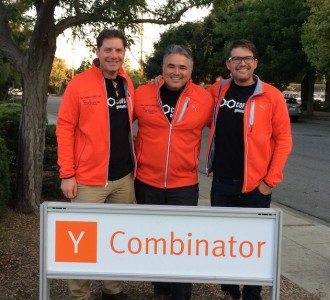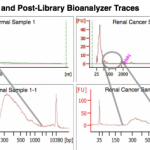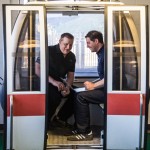
Cofactor’s founders at Y Combinator
I thought it would be interesting to reflect on Cofactor’s time in the Y Combinator Summer 2015 batch after getting seven months of perspective and work under our belts.
I really wanted to put this post together because I lead R&D and innovation for Cofactor (lead is used loosely here since everyone else at Cofactor works to bring the ideas that make it through our filter to fruition, they deserve the accolades) and I believe I have a unique post-YC perspective on the process, filtered through a scientist’s eyes.
I should quickly mention that Cofactor Genomics was formed in 2008 and had been operating as a bootstrap prior to applying to YC. When we first started Cofactor, we were small, scrappy, and guerrila’ed everything (R&D, lab space, marketing, sales, EVERYTHING) to just try and make a mark in the genomics community (pay our mortgages, feed our families and occasionally pay ourselves). After 6 years, and many business “hard knocks”, we had finally built a reputable genomics company with a 10,000 sq/ft state of the art lab space in St. Louis, MO (we all came out of the Washington University Genome Center in St. Louis). And, we have an amazing group of folks that possess an undeniable fire and drive for overcoming R&D challenges and delivering on our client promises. By the time we decided to apply to YC, we had already started to take all of our knowledge, infrastructure and experience and develop disease diagnostics based on a molecule called RNA, which acts a barometer of health in the body.
I took some time this morning to reflect on last summer and quickly jot down some of my most pertinent thoughts.
Application and Interview Process:
- Be Yourself
Cofactor’s founders (Dave, Jarret and I) recognize the future of diagnostics, thus our products and pitch were aligned with that belief. It is important to mention here that 3 years ago when we started to focus our efforts on RNA, it was not a popular diagnostic molecule or biomarker. DNA was where it was at. DNA is much easier to work with and is readily understood in the investment community. It has utility in some disease types, however for many diseases, it is actually non-informative. Thus, to put it bluntly, Cofactor was highly atypical because we focused on RNA and not DNA. That was, and is, OK! Don’t try and think about what the folks at YC want to hear or what they are looking for. Don’t try and angle what you are doing to fit some mold or archetype that has been mentioned about the interview process on the internet. If you were to be chosen under these guises, you are wasting everyone’s time, most importantly your own. Whole-heartedly believe in what you are doing, tell your story, and hope for the best.
- Do it Anyway
Plan to do what you are proposing to do (or already have been doing), even if you don’t get chosen for YC. Why cheat yourself out of an amazing career and experience because you did not get chosen? And, if you don’t believe you can do it without YC’s endorsement, think very critically about why you are applying and the responsibility that comes with running a company. Absolutely, YC is a validating force and entity, however there are many different paths, that lead to the same point → you building out your vision of a hugely successful company . Cofactor would never have accomplished everything we have in such a short time without the help of YC and our investors. But, we never doubted that we would still try if we did not get accepted (admittedly with a MUCH more protracted timeline).
- Content is more important than production value
Don’t overthink or overproduce your application video. You might think it will help you to show how creative or out of the box you think…. don’t do it. I don’t understand what the YC people use as a criteria to pass companies from the video to interview stage, but I can almost guarantee you that it is not how your video was shot with R2D2 in the background or that you are talented enough to sing a song where the words are only binary code. We recorded our video in 3 takes, over Skype, rendered it and sent it in. Probably took us about 15 minutes max to record. On the other hand, It took us multiple hours to write the copy. Spend the time on content and translating what you do, why you do it, etc…. not on production.
- You don’t have to have it all figured out
We tried to prep for the interview the best we could with questions gleaned from the internet, however there is varying information about the process (probably due to the difference in types of people, products and companies that apply). You don’t have to have everything figured out, just be able to talk about what you are doing, why you are doing it, what problem it solves and why your product is different than anyone else’s (even different from a company that is relatively tangential). You’ll be nervous and there is a darn good chance you won’t get picked. If you don’t, go out and start doing what you planned to do, get some traction, and then come back the next year to show YC what they missed out on the first go.
Time during YC S15:
Once accepted to YC, Cofactor’s founders decided to live in Mountain View, CA for the duration of the summer batch and fundraising. The three of us lived together for 3 months (plus an extra month during our seed raise). Our memories and what came out of that time living together is nothing short of amazing, incredible and wonderful. Below are some of my lasting memories and information we learned during that time.
- We developed more effective founder communication strategies. We did not have a choice. We had to move, decide, speak and explain fast. We learned very quickly who was to do and say what when, with the greatest consequence or emotion.
- We were driven to think MUCH more critically about our future as a business, how will we innovate, and most importantly drive revenue. This is not something founders can think about in fits and starts like you do when you are “in the weeds”. A solidified strategy and a malleable tactical has to be developed for team execution. We were able to at least define a version 1 tactical during our time living together. It would not have happened if we had not been required to be in SF for the summer.
- We were able to fully solidify our operational roles in the company, sometimes by default, sometimes by yelling. We still have to work everyday to make sure we are covering the most important things while also delegating to people that are much smarter than us. However, we now understand our founder venn diagram and tactical is handled much more efficiently (Jarret, our CEO, was assigned the duty of ALWAYS buying beers).
- During the time in the house, we had defining conversations, interpolated by the friendships mentioned above, about what we did and didn’t want for Cofactor’s culture. We are still working on this as we grow, however we have at least defined the underlying directives.
- Tuesday night dinners with speakers helped us gain a deeper understanding of the challenges that face all businesses, whether it be hiring, scaling, culture, fundraising, etc. To have the opportunity to hear Anne Wojcicki of 23andMe speak, was an amazing and special night for me. It was also a great time to catch up with other companies that we thought we doing pretty cool things or were just generally cool people (hey Lugg and Verge!).
- The importance of your network becomes very clear during your time at YC. If you don’t have a network, that is OK because you now have the YC network. Cofactor is part of that network and I am actually surprised that not one company in the winter batch asked me for 2-3 additional companies that I could put them in contact with to sell their product (I would offer that info with no hesitation). Be careful, make sure you are not mono-selling (having one thing to accomplish on a call, which is the movement of one unit). One other thing concerning sales, get prepared to do founder sales FOREVER! If there is a point that the founders of your company are not talking with clients (B to C), companies (B to B), and generally anyone that will give you feedback (good or bad), money, or free marketing for your product, YOU WILL FAIL! In our business there are no pedestals or ivory towers (and if there are in yours, do not succumb!).
- When we started YC, I was fuzzy on key performance metrics (KPM). They are much clearer to me know (and I thank Dalton for setting us on the right path). Point is, don’t feel cheated if YC wants you to figure out your KPMs. But, one word of caution here, the KPM’s you have leading up to demo day most likely will not be your KPM’s post fundraising. And, the makeup of them may change as you grow and scale (probably should). Based on our experience in the program and their focus on KPMs, we are now working on a scientific innovation dashboard to use as we iterate through our R&D cycles. We need to have a good way to “grade” our R&D efforts. Thank you Dalton and YC!
- YC will ask you to set goals that seem unachievable. This actually makes sense because most of the founders in the program have never built and sold a company. The YC folks have! They see things differently than we do. They have observed many-many more start-ups succeed than we have (and also fail). Thus, they know companies can attain seemingly unreachable goals, again and again and again. Take on the challenge, it will actually be implemented in the way you run your business. YC will ask you to set high goals because they believe you can hit them, now believe in yourself.
- The founders of Cofactor had conversations with investors that we would have never been able to access without the help of YC. These Investors challenged our ideas, short and near term sales plans, scalability, etc. The answers (or blank stares) we provided to those questions are proving to be invaluable in our current business efforts. We reference them all the time during our planning sessions.
- Even with all of the above, the MOST important thing that came out of living together during YC is that we truly became great friends. We were friends before and had worked together for 10 years prior to starting Cofactor, however, seeing people at work and happy hour builds a certain type of friendship, a working friendship. During our time in the house, we often observed each other in vulnerable personal and professional situations. We also argued and yelled sometimes. Each one of us was stressed and sensitive! One thing we realized was that an amazing thing happens when you observe someone’s vulnerability (and they are willing to show you)… nearly everything you undertake with them will assume a much deeper, complex, and meaningful significance. Building Cofactor is, and will continue to be, one of the hardest things I have undertaken thus far. However, running Cofactor with founders who are my best friends, in some small way, means I have already won.
During every point of last summer, we felt like we were a part of something really special. And still do. These feelings help you to believe you can do anything. How many people are presented this opportunity? Fearless belief proved to be very important when we were talking about our product to investors and asking them to give us money. Hopefully you will have the opportunity to feel the same way about your path and develop a deeper friendship with your co-founders. It is not a guarantee for success, but it certainly makes the process that much more significant!




